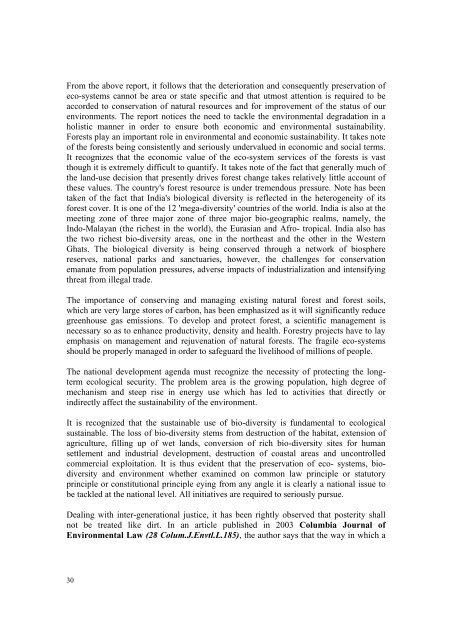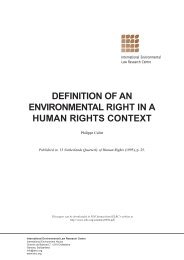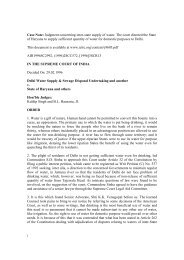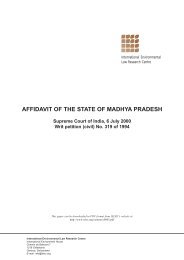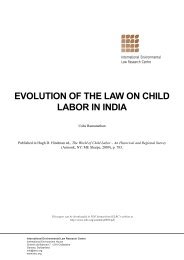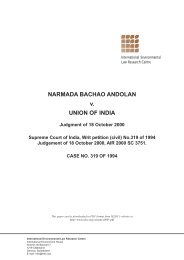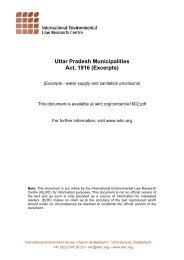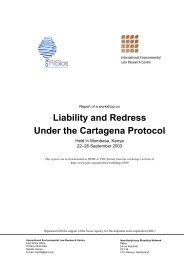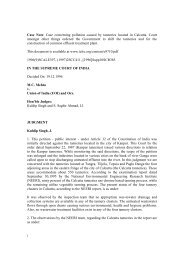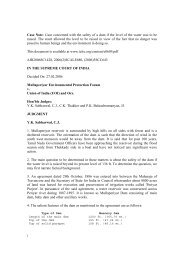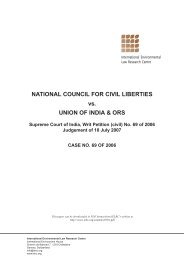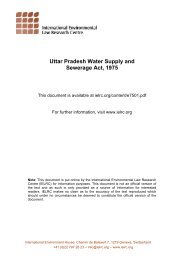T.N. Godavarman Thirumulpad v. Union of India - International ...
T.N. Godavarman Thirumulpad v. Union of India - International ...
T.N. Godavarman Thirumulpad v. Union of India - International ...
You also want an ePaper? Increase the reach of your titles
YUMPU automatically turns print PDFs into web optimized ePapers that Google loves.
From the above report, it follows that the deterioration and consequently preservation <strong>of</strong>eco-systems cannot be area or state specific and that utmost attention is required to beaccorded to conservation <strong>of</strong> natural resources and for improvement <strong>of</strong> the status <strong>of</strong> ourenvironments. The report notices the need to tackle the environmental degradation in aholistic manner in order to ensure both economic and environmental sustainability.Forests play an important role in environmental and economic sustainability. It takes note<strong>of</strong> the forests being consistently and seriously undervalued in economic and social terms.It recognizes that the economic value <strong>of</strong> the eco-system services <strong>of</strong> the forests is vastthough it is extremely difficult to quantify. It takes note <strong>of</strong> the fact that generally much <strong>of</strong>the land-use decision that presently drives forest change takes relatively little account <strong>of</strong>these values. The country's forest resource is under tremendous pressure. Note has beentaken <strong>of</strong> the fact that <strong>India</strong>'s biological diversity is reflected in the heterogeneity <strong>of</strong> itsforest cover. It is one <strong>of</strong> the 12 'mega-diversity' countries <strong>of</strong> the world. <strong>India</strong> is also at themeeting zone <strong>of</strong> three major zone <strong>of</strong> three major bio-geographic realms, namely, theIndo-Malayan (the richest in the world), the Eurasian and Afro- tropical. <strong>India</strong> also hasthe two richest bio-diversity areas, one in the northeast and the other in the WesternGhats. The biological diversity is being conserved through a network <strong>of</strong> biospherereserves, national parks and sanctuaries, however, the challenges for conservationemanate from population pressures, adverse impacts <strong>of</strong> industrialization and intensifyingthreat from illegal trade.The importance <strong>of</strong> conserving and managing existing natural forest and forest soils,which are very large stores <strong>of</strong> carbon, has been emphasized as it will significantly reducegreenhouse gas emissions. To develop and protect forest, a scientific management isnecessary so as to enhance productivity, density and health. Forestry projects have to layemphasis on management and rejuvenation <strong>of</strong> natural forests. The fragile eco-systemsshould be properly managed in order to safeguard the livelihood <strong>of</strong> millions <strong>of</strong> people.The national development agenda must recognize the necessity <strong>of</strong> protecting the longtermecological security. The problem area is the growing population, high degree <strong>of</strong>mechanism and steep rise in energy use which has led to activities that directly orindirectly affect the sustainability <strong>of</strong> the environment.It is recognized that the sustainable use <strong>of</strong> bio-diversity is fundamental to ecologicalsustainable. The loss <strong>of</strong> bio-diversity stems from destruction <strong>of</strong> the habitat, extension <strong>of</strong>agriculture, filling up <strong>of</strong> wet lands, conversion <strong>of</strong> rich bio-diversity sites for humansettlement and industrial development, destruction <strong>of</strong> coastal areas and uncontrolledcommercial exploitation. It is thus evident that the preservation <strong>of</strong> eco- systems, biodiversityand environment whether examined on common law principle or statutoryprinciple or constitutional principle eying from any angle it is clearly a national issue tobe tackled at the national level. All initiatives are required to seriously pursue.Dealing with inter-generational justice, it has been rightly observed that posterity shallnot be treated like dirt. In an article published in 2003 Columbia Journal <strong>of</strong>Environmental Law (28 Colum.J.Envtl.L.185), the author says that the way in which a30


